Sociology Essay: Reflecting on Indigenous Education in Australia
VerifiedAdded on 2023/04/21
|6
|1485
|364
Essay
AI Summary
This sociology essay critically examines the concept of a "classroom without borders" in the context of Aboriginal and Torres Strait Islander children and their families, focusing on the importance of intercultural competence in education. The essay draws upon research, including interviews with families, to assess the impact of educational policies and facilities. It references relevant literature, such as Holland's work on multiple identities, to explore the challenges and opportunities in providing equitable education. The author reflects on their own learning, including the need for cultural competency and improved communication skills. The essay concludes by highlighting the role of governmental interventions, curriculum development, and teacher training in improving educational standards and promoting cultural understanding. The essay also uses references from the assignment brief to support the claims made in the essay.
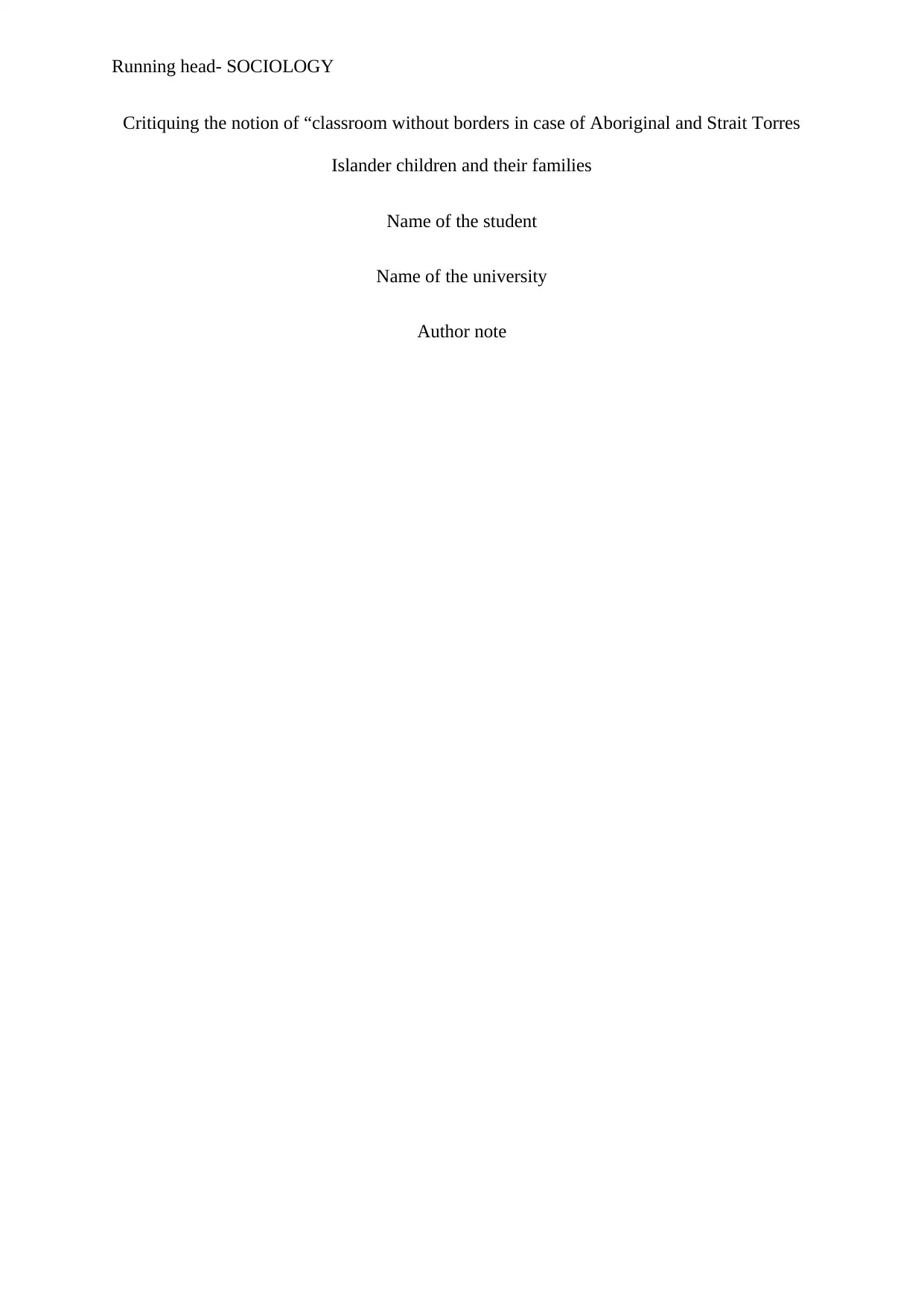
Running head- SOCIOLOGY
Critiquing the notion of “classroom without borders in case of Aboriginal and Strait Torres
Islander children and their families
Name of the student
Name of the university
Author note
Critiquing the notion of “classroom without borders in case of Aboriginal and Strait Torres
Islander children and their families
Name of the student
Name of the university
Author note
Paraphrase This Document
Need a fresh take? Get an instant paraphrase of this document with our AI Paraphraser
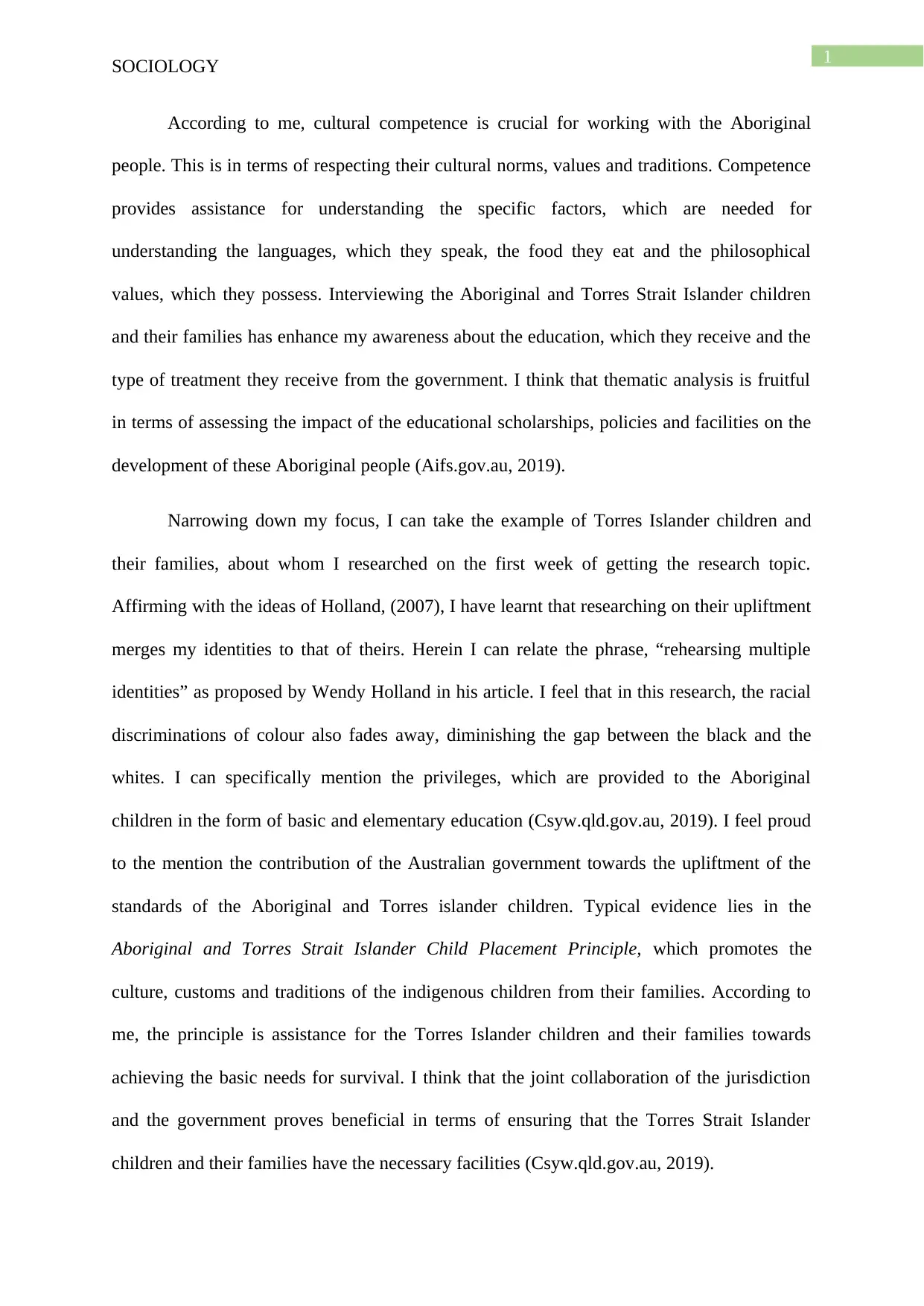
1
SOCIOLOGY
According to me, cultural competence is crucial for working with the Aboriginal
people. This is in terms of respecting their cultural norms, values and traditions. Competence
provides assistance for understanding the specific factors, which are needed for
understanding the languages, which they speak, the food they eat and the philosophical
values, which they possess. Interviewing the Aboriginal and Torres Strait Islander children
and their families has enhance my awareness about the education, which they receive and the
type of treatment they receive from the government. I think that thematic analysis is fruitful
in terms of assessing the impact of the educational scholarships, policies and facilities on the
development of these Aboriginal people (Aifs.gov.au, 2019).
Narrowing down my focus, I can take the example of Torres Islander children and
their families, about whom I researched on the first week of getting the research topic.
Affirming with the ideas of Holland, (2007), I have learnt that researching on their upliftment
merges my identities to that of theirs. Herein I can relate the phrase, “rehearsing multiple
identities” as proposed by Wendy Holland in his article. I feel that in this research, the racial
discriminations of colour also fades away, diminishing the gap between the black and the
whites. I can specifically mention the privileges, which are provided to the Aboriginal
children in the form of basic and elementary education (Csyw.qld.gov.au, 2019). I feel proud
to the mention the contribution of the Australian government towards the upliftment of the
standards of the Aboriginal and Torres islander children. Typical evidence lies in the
Aboriginal and Torres Strait Islander Child Placement Principle, which promotes the
culture, customs and traditions of the indigenous children from their families. According to
me, the principle is assistance for the Torres Islander children and their families towards
achieving the basic needs for survival. I think that the joint collaboration of the jurisdiction
and the government proves beneficial in terms of ensuring that the Torres Strait Islander
children and their families have the necessary facilities (Csyw.qld.gov.au, 2019).
SOCIOLOGY
According to me, cultural competence is crucial for working with the Aboriginal
people. This is in terms of respecting their cultural norms, values and traditions. Competence
provides assistance for understanding the specific factors, which are needed for
understanding the languages, which they speak, the food they eat and the philosophical
values, which they possess. Interviewing the Aboriginal and Torres Strait Islander children
and their families has enhance my awareness about the education, which they receive and the
type of treatment they receive from the government. I think that thematic analysis is fruitful
in terms of assessing the impact of the educational scholarships, policies and facilities on the
development of these Aboriginal people (Aifs.gov.au, 2019).
Narrowing down my focus, I can take the example of Torres Islander children and
their families, about whom I researched on the first week of getting the research topic.
Affirming with the ideas of Holland, (2007), I have learnt that researching on their upliftment
merges my identities to that of theirs. Herein I can relate the phrase, “rehearsing multiple
identities” as proposed by Wendy Holland in his article. I feel that in this research, the racial
discriminations of colour also fades away, diminishing the gap between the black and the
whites. I can specifically mention the privileges, which are provided to the Aboriginal
children in the form of basic and elementary education (Csyw.qld.gov.au, 2019). I feel proud
to the mention the contribution of the Australian government towards the upliftment of the
standards of the Aboriginal and Torres islander children. Typical evidence lies in the
Aboriginal and Torres Strait Islander Child Placement Principle, which promotes the
culture, customs and traditions of the indigenous children from their families. According to
me, the principle is assistance for the Torres Islander children and their families towards
achieving the basic needs for survival. I think that the joint collaboration of the jurisdiction
and the government proves beneficial in terms of ensuring that the Torres Strait Islander
children and their families have the necessary facilities (Csyw.qld.gov.au, 2019).
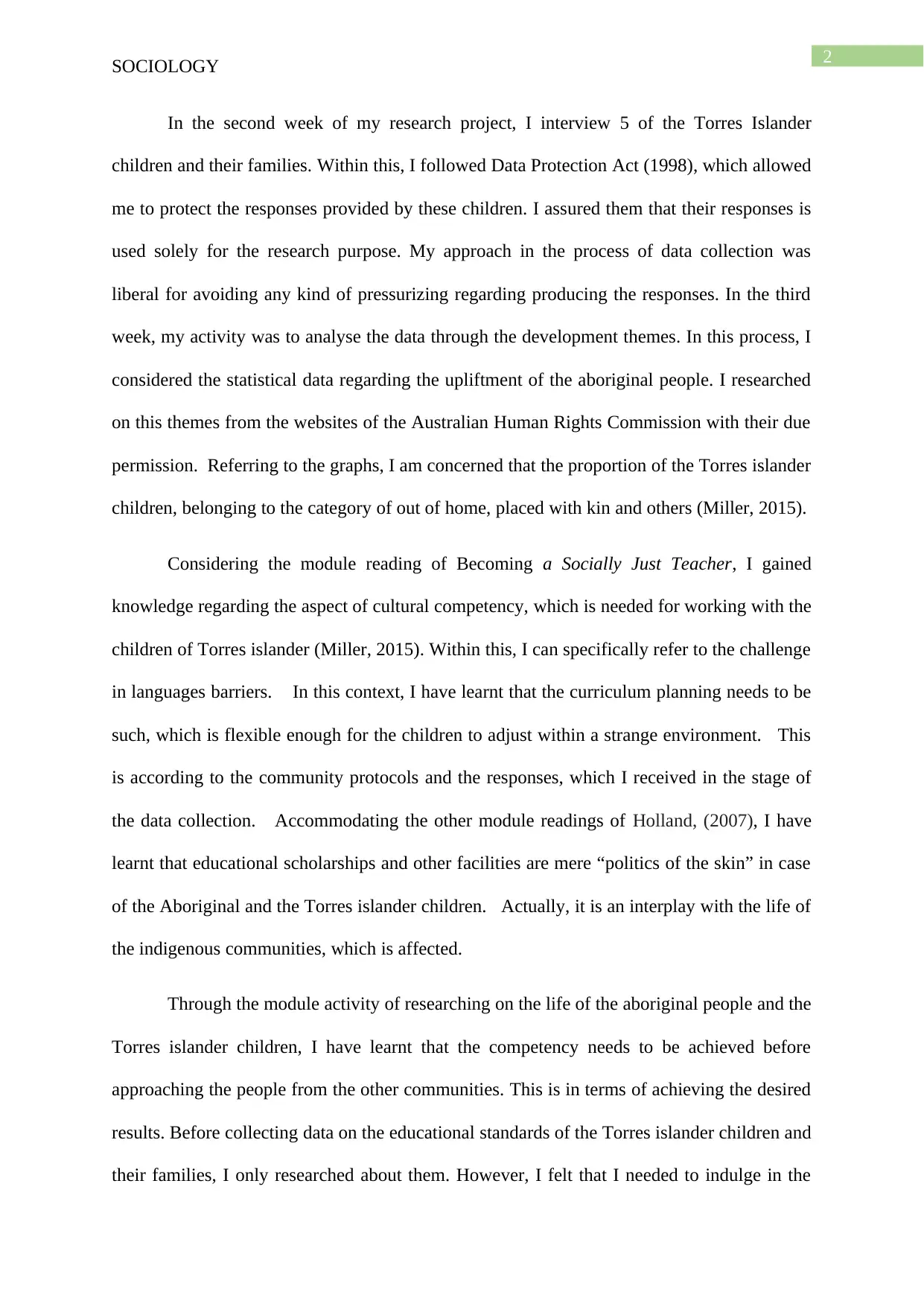
2
SOCIOLOGY
In the second week of my research project, I interview 5 of the Torres Islander
children and their families. Within this, I followed Data Protection Act (1998), which allowed
me to protect the responses provided by these children. I assured them that their responses is
used solely for the research purpose. My approach in the process of data collection was
liberal for avoiding any kind of pressurizing regarding producing the responses. In the third
week, my activity was to analyse the data through the development themes. In this process, I
considered the statistical data regarding the upliftment of the aboriginal people. I researched
on this themes from the websites of the Australian Human Rights Commission with their due
permission. Referring to the graphs, I am concerned that the proportion of the Torres islander
children, belonging to the category of out of home, placed with kin and others (Miller, 2015).
Considering the module reading of Becoming a Socially Just Teacher, I gained
knowledge regarding the aspect of cultural competency, which is needed for working with the
children of Torres islander (Miller, 2015). Within this, I can specifically refer to the challenge
in languages barriers. In this context, I have learnt that the curriculum planning needs to be
such, which is flexible enough for the children to adjust within a strange environment. This
is according to the community protocols and the responses, which I received in the stage of
the data collection. Accommodating the other module readings of Holland, (2007), I have
learnt that educational scholarships and other facilities are mere “politics of the skin” in case
of the Aboriginal and the Torres islander children. Actually, it is an interplay with the life of
the indigenous communities, which is affected.
Through the module activity of researching on the life of the aboriginal people and the
Torres islander children, I have learnt that the competency needs to be achieved before
approaching the people from the other communities. This is in terms of achieving the desired
results. Before collecting data on the educational standards of the Torres islander children and
their families, I only researched about them. However, I felt that I needed to indulge in the
SOCIOLOGY
In the second week of my research project, I interview 5 of the Torres Islander
children and their families. Within this, I followed Data Protection Act (1998), which allowed
me to protect the responses provided by these children. I assured them that their responses is
used solely for the research purpose. My approach in the process of data collection was
liberal for avoiding any kind of pressurizing regarding producing the responses. In the third
week, my activity was to analyse the data through the development themes. In this process, I
considered the statistical data regarding the upliftment of the aboriginal people. I researched
on this themes from the websites of the Australian Human Rights Commission with their due
permission. Referring to the graphs, I am concerned that the proportion of the Torres islander
children, belonging to the category of out of home, placed with kin and others (Miller, 2015).
Considering the module reading of Becoming a Socially Just Teacher, I gained
knowledge regarding the aspect of cultural competency, which is needed for working with the
children of Torres islander (Miller, 2015). Within this, I can specifically refer to the challenge
in languages barriers. In this context, I have learnt that the curriculum planning needs to be
such, which is flexible enough for the children to adjust within a strange environment. This
is according to the community protocols and the responses, which I received in the stage of
the data collection. Accommodating the other module readings of Holland, (2007), I have
learnt that educational scholarships and other facilities are mere “politics of the skin” in case
of the Aboriginal and the Torres islander children. Actually, it is an interplay with the life of
the indigenous communities, which is affected.
Through the module activity of researching on the life of the aboriginal people and the
Torres islander children, I have learnt that the competency needs to be achieved before
approaching the people from the other communities. This is in terms of achieving the desired
results. Before collecting data on the educational standards of the Torres islander children and
their families, I only researched about them. However, I felt that I needed to indulge in the
⊘ This is a preview!⊘
Do you want full access?
Subscribe today to unlock all pages.

Trusted by 1+ million students worldwide
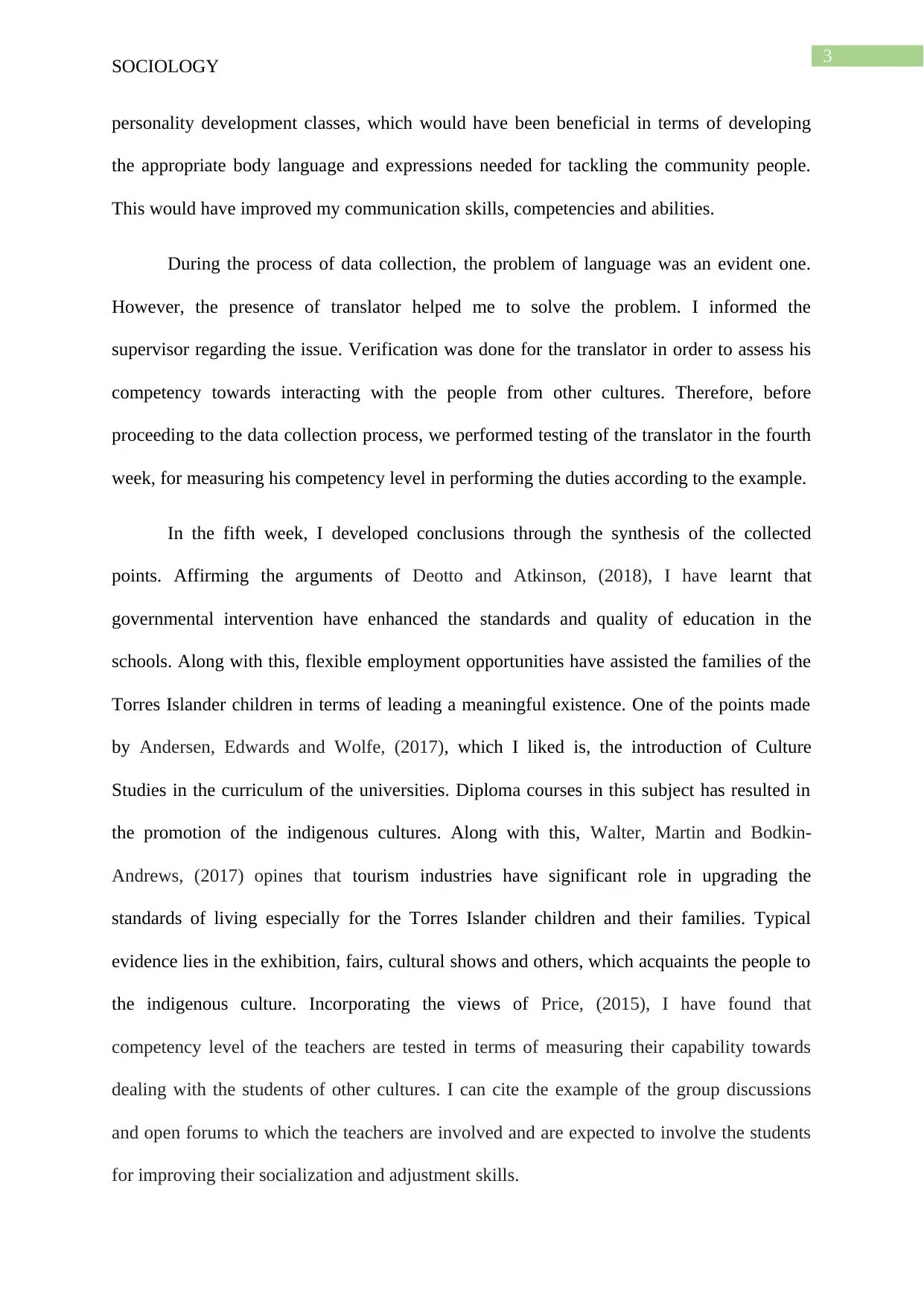
3
SOCIOLOGY
personality development classes, which would have been beneficial in terms of developing
the appropriate body language and expressions needed for tackling the community people.
This would have improved my communication skills, competencies and abilities.
During the process of data collection, the problem of language was an evident one.
However, the presence of translator helped me to solve the problem. I informed the
supervisor regarding the issue. Verification was done for the translator in order to assess his
competency towards interacting with the people from other cultures. Therefore, before
proceeding to the data collection process, we performed testing of the translator in the fourth
week, for measuring his competency level in performing the duties according to the example.
In the fifth week, I developed conclusions through the synthesis of the collected
points. Affirming the arguments of Deotto and Atkinson, (2018), I have learnt that
governmental intervention have enhanced the standards and quality of education in the
schools. Along with this, flexible employment opportunities have assisted the families of the
Torres Islander children in terms of leading a meaningful existence. One of the points made
by Andersen, Edwards and Wolfe, (2017), which I liked is, the introduction of Culture
Studies in the curriculum of the universities. Diploma courses in this subject has resulted in
the promotion of the indigenous cultures. Along with this, Walter, Martin and Bodkin-
Andrews, (2017) opines that tourism industries have significant role in upgrading the
standards of living especially for the Torres Islander children and their families. Typical
evidence lies in the exhibition, fairs, cultural shows and others, which acquaints the people to
the indigenous culture. Incorporating the views of Price, (2015), I have found that
competency level of the teachers are tested in terms of measuring their capability towards
dealing with the students of other cultures. I can cite the example of the group discussions
and open forums to which the teachers are involved and are expected to involve the students
for improving their socialization and adjustment skills.
SOCIOLOGY
personality development classes, which would have been beneficial in terms of developing
the appropriate body language and expressions needed for tackling the community people.
This would have improved my communication skills, competencies and abilities.
During the process of data collection, the problem of language was an evident one.
However, the presence of translator helped me to solve the problem. I informed the
supervisor regarding the issue. Verification was done for the translator in order to assess his
competency towards interacting with the people from other cultures. Therefore, before
proceeding to the data collection process, we performed testing of the translator in the fourth
week, for measuring his competency level in performing the duties according to the example.
In the fifth week, I developed conclusions through the synthesis of the collected
points. Affirming the arguments of Deotto and Atkinson, (2018), I have learnt that
governmental intervention have enhanced the standards and quality of education in the
schools. Along with this, flexible employment opportunities have assisted the families of the
Torres Islander children in terms of leading a meaningful existence. One of the points made
by Andersen, Edwards and Wolfe, (2017), which I liked is, the introduction of Culture
Studies in the curriculum of the universities. Diploma courses in this subject has resulted in
the promotion of the indigenous cultures. Along with this, Walter, Martin and Bodkin-
Andrews, (2017) opines that tourism industries have significant role in upgrading the
standards of living especially for the Torres Islander children and their families. Typical
evidence lies in the exhibition, fairs, cultural shows and others, which acquaints the people to
the indigenous culture. Incorporating the views of Price, (2015), I have found that
competency level of the teachers are tested in terms of measuring their capability towards
dealing with the students of other cultures. I can cite the example of the group discussions
and open forums to which the teachers are involved and are expected to involve the students
for improving their socialization and adjustment skills.
Paraphrase This Document
Need a fresh take? Get an instant paraphrase of this document with our AI Paraphraser
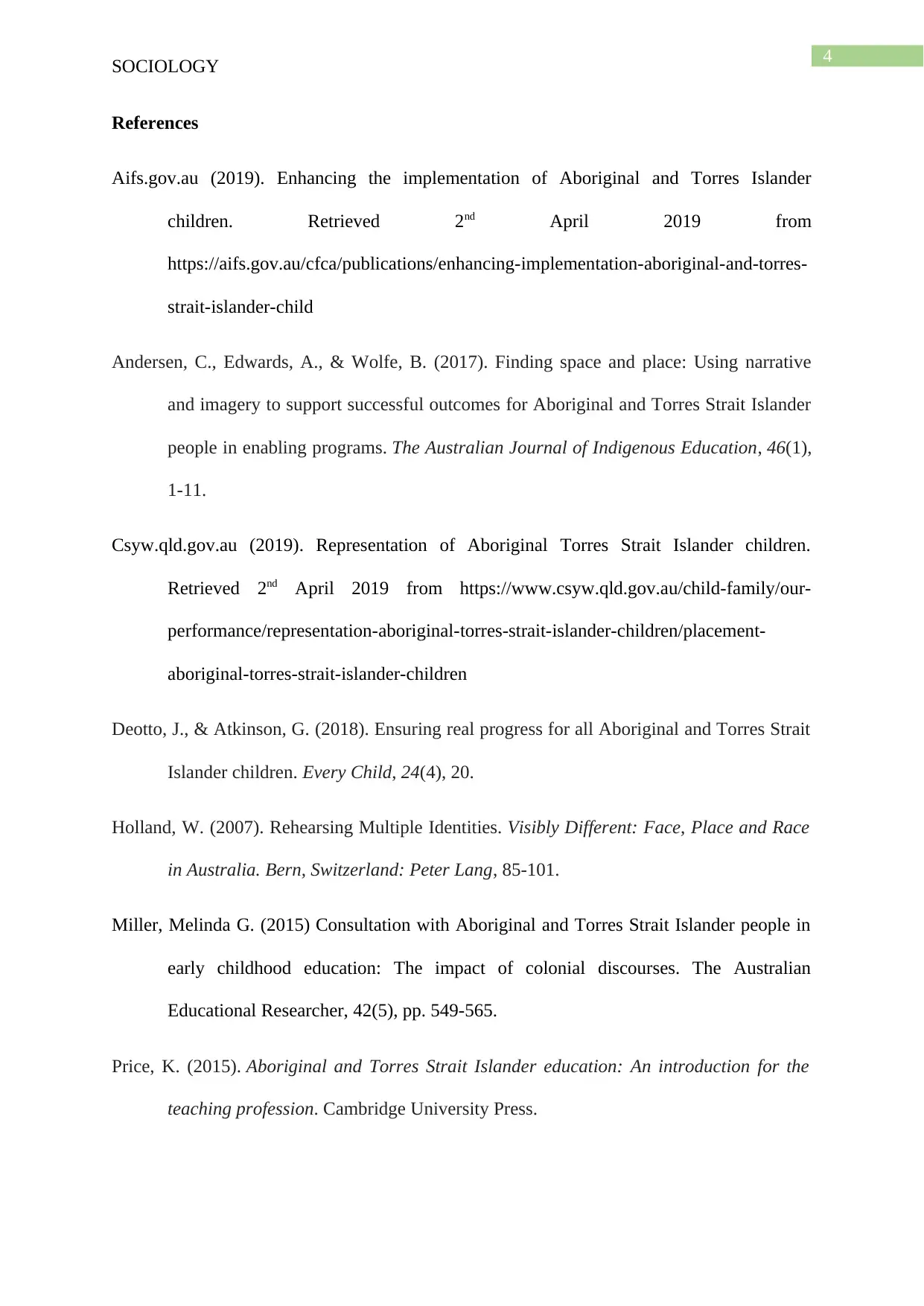
4
SOCIOLOGY
References
Aifs.gov.au (2019). Enhancing the implementation of Aboriginal and Torres Islander
children. Retrieved 2nd April 2019 from
https://aifs.gov.au/cfca/publications/enhancing-implementation-aboriginal-and-torres-
strait-islander-child
Andersen, C., Edwards, A., & Wolfe, B. (2017). Finding space and place: Using narrative
and imagery to support successful outcomes for Aboriginal and Torres Strait Islander
people in enabling programs. The Australian Journal of Indigenous Education, 46(1),
1-11.
Csyw.qld.gov.au (2019). Representation of Aboriginal Torres Strait Islander children.
Retrieved 2nd April 2019 from https://www.csyw.qld.gov.au/child-family/our-
performance/representation-aboriginal-torres-strait-islander-children/placement-
aboriginal-torres-strait-islander-children
Deotto, J., & Atkinson, G. (2018). Ensuring real progress for all Aboriginal and Torres Strait
Islander children. Every Child, 24(4), 20.
Holland, W. (2007). Rehearsing Multiple Identities. Visibly Different: Face, Place and Race
in Australia. Bern, Switzerland: Peter Lang, 85-101.
Miller, Melinda G. (2015) Consultation with Aboriginal and Torres Strait Islander people in
early childhood education: The impact of colonial discourses. The Australian
Educational Researcher, 42(5), pp. 549-565.
Price, K. (2015). Aboriginal and Torres Strait Islander education: An introduction for the
teaching profession. Cambridge University Press.
SOCIOLOGY
References
Aifs.gov.au (2019). Enhancing the implementation of Aboriginal and Torres Islander
children. Retrieved 2nd April 2019 from
https://aifs.gov.au/cfca/publications/enhancing-implementation-aboriginal-and-torres-
strait-islander-child
Andersen, C., Edwards, A., & Wolfe, B. (2017). Finding space and place: Using narrative
and imagery to support successful outcomes for Aboriginal and Torres Strait Islander
people in enabling programs. The Australian Journal of Indigenous Education, 46(1),
1-11.
Csyw.qld.gov.au (2019). Representation of Aboriginal Torres Strait Islander children.
Retrieved 2nd April 2019 from https://www.csyw.qld.gov.au/child-family/our-
performance/representation-aboriginal-torres-strait-islander-children/placement-
aboriginal-torres-strait-islander-children
Deotto, J., & Atkinson, G. (2018). Ensuring real progress for all Aboriginal and Torres Strait
Islander children. Every Child, 24(4), 20.
Holland, W. (2007). Rehearsing Multiple Identities. Visibly Different: Face, Place and Race
in Australia. Bern, Switzerland: Peter Lang, 85-101.
Miller, Melinda G. (2015) Consultation with Aboriginal and Torres Strait Islander people in
early childhood education: The impact of colonial discourses. The Australian
Educational Researcher, 42(5), pp. 549-565.
Price, K. (2015). Aboriginal and Torres Strait Islander education: An introduction for the
teaching profession. Cambridge University Press.
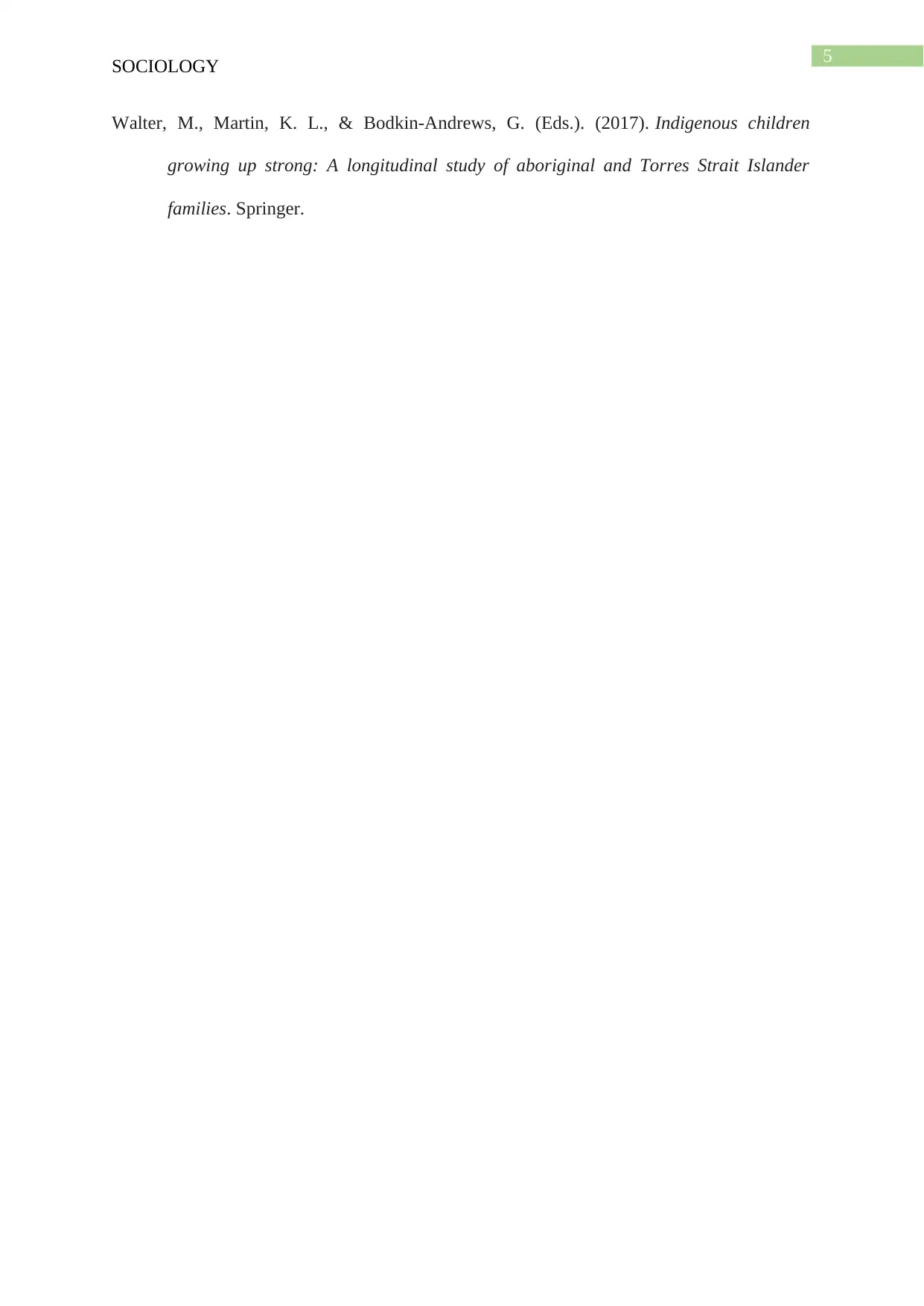
5
SOCIOLOGY
Walter, M., Martin, K. L., & Bodkin-Andrews, G. (Eds.). (2017). Indigenous children
growing up strong: A longitudinal study of aboriginal and Torres Strait Islander
families. Springer.
SOCIOLOGY
Walter, M., Martin, K. L., & Bodkin-Andrews, G. (Eds.). (2017). Indigenous children
growing up strong: A longitudinal study of aboriginal and Torres Strait Islander
families. Springer.
⊘ This is a preview!⊘
Do you want full access?
Subscribe today to unlock all pages.

Trusted by 1+ million students worldwide
1 out of 6
Related Documents
Your All-in-One AI-Powered Toolkit for Academic Success.
+13062052269
info@desklib.com
Available 24*7 on WhatsApp / Email
![[object Object]](/_next/static/media/star-bottom.7253800d.svg)
Unlock your academic potential
Copyright © 2020–2026 A2Z Services. All Rights Reserved. Developed and managed by ZUCOL.




